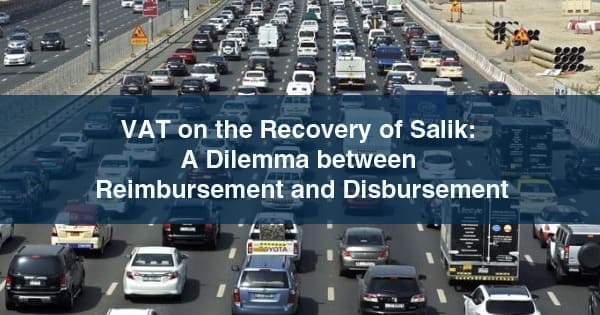
The levying of a toll or a fee for access to a road or a bridge is a practice that has existed since antiquity. Over time, the collection of such tolls advanced from physical toll booths to electronic toll gates. In the UAE, Dubai was the first Emirate in year 2007 to introduce an electronic road toll system. The system popularly now known as ‘Salik’ involves collection of fees by means of a deduction from a prepaid user account, every time a vehicle passes through the toll gates.
In late 2017, at the time of the VAT implementation, there was ambiguity regarding the taxability of the salik fees. The Road Transport Authority (RTA) clarified the matter, stating that such fees were outside the scope of VAT. Although the RTA statement provided relief for the public at large, there was confusion among the car rental companies regarding the treatment that was to be adopted for the subsequent recovery of salik fees from the customer– would they be outside the scope of VAT,as clarified by the RTA,or would they attract VAT of 5% as a part of the car rental service?
After 2 years of VAT in the UAE and following the public clarification by the FTA on Disbursements and Reimbursements, the taxability of salik fees as recovery has gained attention. In clarification, the FTA acknowledges the possibility of commercial arrangements that involve a supplier or a service provider incurring expenses or making payment on behalf of customer and subsequently recovering the same from the customer.The FTA has stated that recoveries can either be classified as ‘reimbursement’ (expenses incurred during the course of making supplies) within the scope of VAT, or as‘disbursement’ (amounts paid purely on behalf of the customer), which are outside the scope of VAT.
Considering the clarification, it is necessary to examine whether salik fees incurred by the car rental companies or any other service provider and recovered from the customer, is a reimbursement or a disbursement from a VAT perspective. The following aspects could be relevant:
Beneficiary of Toll Services: Generally, the consideration for car rental services is based on usage (in kilometers) or on the tenure of the lease. To ease the driving of rental car within the region, the car rental companies provide salik tags affixed to the car on the condition that salik fees, as levied by the RTA, are paid at actual with a separate administrative fee. Using the beneficiary test, it is possible to argue that the services to access the road network was received by the customer directly and the car rental company has merely paid the salik fees on customer’s behalf. As such, the recovery of the salik should qualify as a disbursement.
Legal Obligation: As per Article 3 of Dubai Toll Law No. 22/2006, the authorities have power to levy toll on the vehicle owners who uses the road network in the Emirate. Basis the said article, the VAT authorities can take a view that the owner of the vehicle is the car rental company which has been imposed with salik and not the customer driving the vehicle and therefore, it should qualify as a reimbursement subject to VAT.
Accounting treatment: The accounting of salik cost in the books is one of the critical aspects to examine the correct VAT treatment. The salik paid to the RTA is recognized as receivable from the customer and is not accounted as business expense. This clearly shows that the salik paid is not the incidental cost of car rental business and is recognized as expense paid on behalf of the customer and therefore should qualify as disbursement.
Conclusion
The issue surrounding the applicable VAT treatment have emerged as a result of salik fees being deducted electronically, rather than being collected by means of a physical toll booth, where the customer would be able to pay the fees, without any VAT impact. Should the VAT position change due to an electronic system for collecting toll fees? It will be interesting to see how the tax position evolves before the authorities, or before a tax dispute resolution committee or the federal courts in a potential tax dispute.
Disclaimer: Content posted is for informational & knowledge sharing purposes only, and is not intended to be a substitute for professional advice related to tax, finance or accounting. The view/interpretation of the publisher is based on the available Law, guidelines and information. Each reader should take due professional care before you act after reading the contents of that article/post. No warranty whatsoever is made that any of the articles are accurate and is not intended to provide, and should not be relied on for tax or accounting advice.